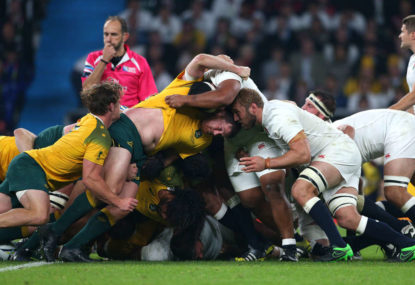Social media is a funny beast. It’s hard to know what, if any, part our #ScrumStraightJoe campaign from last week played in the Wallabies exceptional 33-13 Rugby World Cup win over England at Twickenham, but it’s certain that the Wallabies’ scrum did a job on their opposition.
When Romain Poite called time off in the 49th minute, England’s scrummaging Plan A was laid bare.
“Three times, you were definitely not straight,” Poite told England loosehead Joe Marler, complete with hand gestures illustrating the less-than-subtle ploy. Marler is half hunched over, ironically, in the one moment when it would’ve paid to employ a straighter posture.
MORE:
>> WALLABIES VS ENGLAND LIVE BLOG
>> WALLABIES VS ENGLAND MATCH REPORT
>> FIVE TALKING POINTS
Marler attempts to interject, and asks if Wallabies tighthead Sekope Kepu is also straight.
“Yes, he is,” Poite replies. “Now, you have to be very disciplined and get a straight angle, alright?”
The message was clear. For whatever reason, Poite was all over the English pack’s liberal interpretation of what constitutes packing straight, and here he was, a French referee with a long history of whistling the Australian scrum off the park, in the most decisive moment of the biggest pool game in Rugby World Cup history, giving the English loosehead his last rites.
“Number 1; not straight,” Poite reiterated the penalty, as Marler walked backwards toward the England defensive line.
After Wallabies flyhalf Bernard Foley kicked the penalty, to put Australia ahead 20-3, Marler was replaced by Mako Vunipola.
#ScrumStraightJoe had worked.
The scrum immediately before this one, about four minutes earlier, was won by the Wallabies eventually after England wheeled it, but Poite saw Marler’s outside shoulder bending toward the inside right in front of him.
Seven minutes before halftime, Poite looked like he was going to penalise Australia for Kepu collapsing, only to turn around and point toward the Wallabies after deciding that it was Marler’s boring in that had caused the Wallabies to go down. From the penalty and resulting lineout, Australia went two phases to the left, before Foley cut back to the open side with Beale on his inside.
They both broke through the English line and Foley scored his second try for the match. A 17-3 lead at the break was just about perfect for the Wallabies.
There had been a lot of talk over the last week highlighting and defending the English scrum tactics, in the mainstream media, but especially in the online rugby media and on social media, of which we obviously had our two cents as well.
Much of it was to point out the obvious illegalities, while plenty of it was just good old banter. However, one thing became clear to me, that once English pundits and ex-players started returning serve with counter-claims of issues with the Wallabies maul, there was a genuine fear that the Wallabies scrum was good enough to win scrum penalties in their own right.
And this was going to be an issue for England, whose game is so strenuously built around their scrummaging.
Throughout the tournament, and several times in this game through Owen Farrell, England would kick from their half to a point around the opposition ten-metre line, ideally somewhere near the 15m ‘tramline’, which would be contested by their winger. If they got the ball back, well and good; if they knocked it on, they could scrum for a penalty.
So even exiting out of their own half involved a scrum strategy. But with Poite now onto them, and with a 17-point deficit, England very quickly needed a plan B.
And they just couldn’t find one.
Sure, they found some points midway through the second half on the back of some loose Wallabies’ passing, and Farrell even kicked a penalty when Beale was forced to clean up with little Wallabies support around him. But by this stage, the panic had begun to set in.
And by the time Farrell found himself yellow-carded out of the match inside the last ten – in which Sam Burgess could easily have gone too, for his high shot on Michael Hooper – that panic made way for a depressing realisation that England’s time in this tournament was done.
When they needed something from some fairly talented players, England came up empty.
They had been smashed at the breakdown from the outset, with David Pocock having a field day, to the extent that Chris Robshaw’s only involvement in the match appeared to be to take lectures from an increasingly frustrated French referee.
Farrell was well contained and couldn’t unlock his midfield, while Foley’s excellent kicking game kept the ball away from the left corner fullback Mike Brown prefers to run from.
And once the scrum was no longer an option, England had nothing. The playbook had only blank pages.
And while it’s cool to think #ScrumStraightJoe might have played a part in that, the reality is it might not have made any difference at all. But the overall focus on the English scrummaging tactics must’ve had an impact, because you could see the looks on their faces penalty after penalty.
‘But we were getting away with that last week?’
In the overall scheme of things, the Wallabies will know there is still much to work on before taking on Wales next weekend. They were mostly excellent, but certainly not perfect. They can certainly find more improvement before coming back to ‘Twickers’ next weekend.
But for now there’s a well-deserved celebration to be had, too, to mark what may well be the perception about the Australian scrum finally changing.
And what a time it suddenly is, to be an Australian rugby fan!





























































































